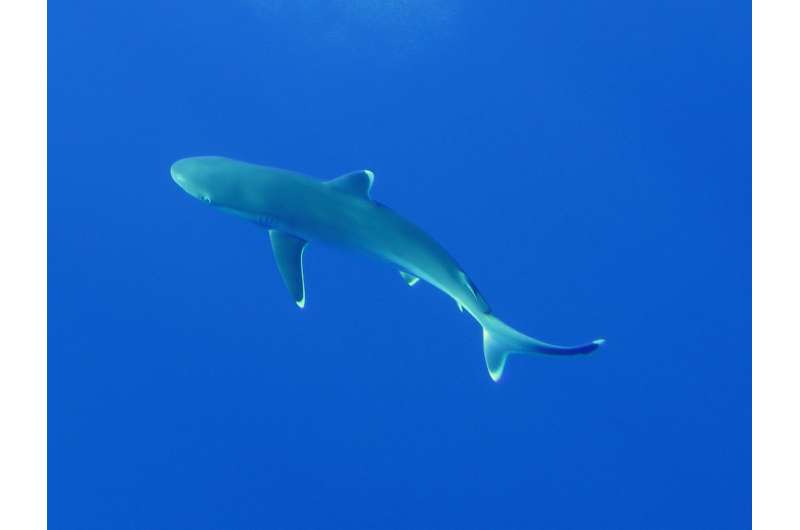March 8, 2018 report
Study shows decline of shark populations even in remote 'pristine' archipelago

A team of researchers with members from the U.S., France and the U.K. has found evidence showing reductions in shark populations in a part of the Indian ocean thought to be nearly pristine—the Chagos archipelago. In their paper published on the open access site Science Advances, the group describes their study of shark populations in the archipelago over time and what they found.
In this modern age of human encroachment across the planet, there are still some places that are believed to be very much like they were before humans arrived, including the Chagos archipelago in the middle of the Indian Ocean, thousands of miles away from any major land mass. In this new effort, the researchers wondered if, despite its remoteness, the archipelago might actually have been changed by humans. They chose this particular archipelago because unlike similar ones, it has a recorded history. Humans have been visiting the archipelago and places near it for hundreds of years, and many of them have kept records of things like fish and shark population estimates. The researchers chose to focus on sharks, because they are so abundant and because they are a dominant species, and thus have a major impact on the environment in which they live.
The researchers gathered data from a variety of sources, starting with a survey conducted in the area back in 1948. They were also able to obtain data from the 1970s as teams of researchers in the area began conducting surveys by actually getting in the water. They also consulted catch records going back approximately half a century.
The team analyzed their data with an algorithm designed to offer population predictions given a variety of environmental conditions. It suggested that despite appearances, shark populations in the archipelago are far lower than they would have been had humans not appeared on the scene—in some cases, dramatically so. One example, they note, was silvertip sharks. The computer showed them to be 93 percent below predicted baseline levels.
The reduced populations, the researchers suggest, are almost certainly due to overfishing by humans—some legit, some not. The big takeaway from their study is that looks can be deceiving—the Chagos archipelago might appear undisturbed, but it is not. You can even find human trash among the coral, the researchers point out.
More information: Francesco Ferretti et al. Shark baselines and the conservation role of remote coral reef ecosystems, Science Advances (2018). DOI: 10.1126/sciadv.aaq0333
Abstract
Scientific monitoring has recorded only a recent fraction of the oceans' alteration history. This biases our understanding of marine ecosystems. Remote coral reef ecosystems are often considered pristine because of high shark abundance. However, given the long history and global nature of fishing, sharks' vulnerability, and the ecological consequences of shark declines, these states may not be natural. In the Chagos archipelago, one of the remotest coral reef systems on the planet, protected by a very large marine reserve, we integrated disparate fisheries and scientific survey data to reconstruct baselines and long-term population trajectories of two dominant sharks. In 2012, we estimated 571,310 gray reef and 31,693 silvertip sharks, about 79 and 7% of their baseline levels. These species were exploited longer and more intensively than previously thought and responded to fishing and protection with variable and compensatory population trajectories. Our approach highlights the value of integrative and historical analyses to evaluate large marine ecosystems currently considered pristine.
Journal information: Science Advances
© 2018 Phys.org





















